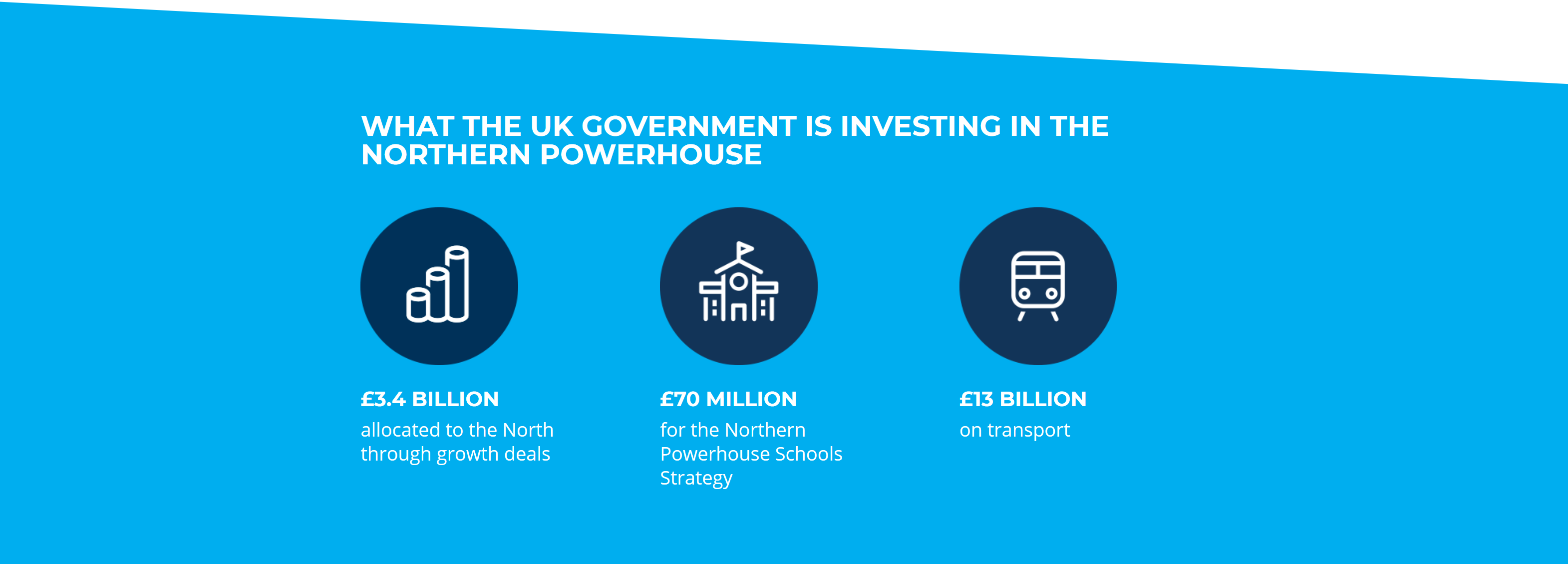Building a Northern Powerhouse is about boosting the local economy by investing in skills, innovation, transport, and culture, as well as devolving significant powers and budgets to directly elected mayors to ensure decisions in the North are made by the North.
The UK Government are backing business growth right across the North and giving our great cities the power and resources they need to reach their huge untapped potential.
Northern Powerhouse Developments
The Northern Powerhouse was proposed by Chancellor George Osborne in 2014 where combined development projects were planned for the group of northern cities that were located close to each other. Recently, UK Prime Minister Boris Johnson spoke about devolving liability of the rail franchise to woo voters, as the Labour party has been accusing the government of holding the region back. Basically, the economic plan entails development in the area of business, digital and manufacturing in cities known for specific skills. Like - automotive and vehicle production can be found in the North/East, and Leeds is known for finance, healthcare, and education. There are many universities in these cities and these are growing education providers, at the same time as they offer attractive opportunities to live and work. Transportation facilities empower businesses that can recruit wider labor pool and the government plans to create the HS2 ‘Y’ network to provide a wider range of jobs to the people without getting restricted by the distance from home. The Northern powerhouse rail project is part of the plan to deliver the high-speed rail link across the North.
2- Northern Powerhouse Rail
Rail is one of the best ways for a large number of workers to move to and from jobs. It improves business to business travel and cities need a world-class rail network supported by smart ticketing and easy fare systems that can make the journey fast, less crowded and easier for the commuters. It is believed that the Northern Powerhouse Rail is the key to achieving growth in the region, and both the HS2 and the rail projects are vital to address the poor transportation links between the cities in the Midlands and North. Improvement in transportation links between the cities could transform the city-to-city rail connectivity east-west, north-south, and both HS2 and a new Trans North system was proposed, which could reduce the travel time across the intercity network.
As per initial reports found there were several problems in the previous systems-
- The connectivity between the north and south is slow and crowded at peak time.
- The region faces unacceptable crowding of the commuters and there is less room for people to sit conveniently while traveling. The quality of transportation is poor, which restricts many from traveling in these areas.
- A rail journey in the North along the east-west is slow. It takes the journeys longer for equivalent distance than any other part of Europe. The reports claim that it is easy and quicker to travel from London to Paris than from Liverpool to Hull, which is less than half the distance. The overall journey to nearby places takes a long time and there are many critical connections between the centres, where improvement is needed to promote easy transportation.
- There is a need to improve the infrastructure along the long train routes and have more routes and fast train options along with the metro style frequencies and introduce new Intercity to improve connectivity between London to Leeds.
- The frequency of trains between key cities like Sheffield and Manchester is low. There were just two fast trains between the two cities and it took over 50 minutes to make the journey that is just 40 miles.
- The old train services are inadequate and inaccessible to disabled passengers.
The Network Rail project finds the journey between Liverpool and Manchester can be made in 20 minutes and airport connectivity between the cities can further improve services. From Manchester to Leeds tunneling can be used to improve speed to restrict the travel time to 30 minutes.
3- Northern Powerhouse Partnership
The Northern Powerhouse Partnership refers to the independent body that was launched in September 2016 to increase the strength of Northern cities, which could, in due course help the UK Economy. The body was chaired by Osborne, where the initial reports on the cities were released. The 2017 report found – the plan could help in the growth of the region and economy by delivering over £100bn that could create 850,000 new jobs.
The initial plan also included–
- The delivery of road connectivity to prioritize the multimodal freight strategy for the trade and freight movement, and across the national and international markets.
- Embracing transformational investment in technology by increasing investment in the area of science.
- Improving connectivity to Manchester Airport through the Trans-North and connectivity to other major airports.
- Integrated ticketing structure for all modes of transportation.
The new plan was to transfer power from the Westminster to the northern cities and new metro mayors could be formed who possess greater power to run the cities. The selection of metro mayor was made through metro mayor elections which were held in the cities- Liverpool City Region, Greater Manchester, Tees Valley, and Sheffield City Region. Currently, 47.1 percent of the region is led by the mayor and the scheme helped in improving transportation running where the transport organization prepared to invest over £70bn in the plan.
4- Is the UK's Northern Powerhouse Dead?
The plan is not dead as it looks but it faced one of the biggest setbacks in January when the Treasury reduced the loan guarantee by £1.5bn it had given to the Sirius to reduce the risk to taxpayers. The project addresses the poor transport links between the cities – that have been hindering the economic growth of the region, it is believed the integration of such plans will provide new jobs and help to make most of the connectivity that was not present.
The HS2 Economic Growth Conference of Leeds in September this year aims to discuss major investment and infrastructure projects in the North where the lack of investment has been holding productivity back. Experts say that the investment made on HS2 and NPR would indicate that the sector faces historical contradictions, especially, in the transportation and infrastructure sectors, where most of the investments were made in the capital city but now the trend must change and all other regions should be given opportunity and funds to rebalance and participate in delivering to the economy.
5- What do northerners in England think of the northern powerhouse?
Connectivity is the key area that is needed to improve the connection between the economic centres that will allow the clusters to develop, support trade and increase interaction, to develop into specialized centres. People find it difficult to travel to work and transportation is the major issue where access to service requires a lot of traveling. Such issues hinder local businesses activities, affect jobs and make it difficult for the businesses to deliver competitive services.
The business community and the political leaders have been raising their concerns over the lack of transportation links and the need to get a full delivery of both the HS2 and the Northern Powerhouse Rail for improving transportation links throughout the North. The leaders say that improvement in connectivity from the Midlands to the region can help in improving productivity, boosting jobs, improving job skills and help in building a low carbon economy.
People hold the Northern Powerhouse Strategy should include -
- Next-generation roads to improve connectivity, while, the experts can explore options to resolve the problem of congestion to carry people and goods. A better east to west road link connectivity is needed to get more reliable journey time between the major cities within the region.
- The development towards the construction of expressway and motorways can ensure the traffic remains free-flowing and fast.
- The current fare structure makes it difficult for people to comprehend the actual price to identify the true cost of their journey. Currently, there is no single ticketing system and no single source of information where one can get the timetables and other schemes to buy tickets for their journey. Smart travel options should replace the complex fare structure. There is a need to have a single smart ticketing solution which can work for all modes of transportation.
6- What is impeding the development of the northern powerhouse rail in northern England?
There has been much talked about the NPD but there is little evidence of its emergence. Some believe that it may take over 30 years for the government to provide the North with the transport spending alike the capital city. The latest IPPR North report based on the government’s list of planned projects and funding states how the government plans to spend on transport infrastructure in different regions - London is set to receive £3,636 per person, while, North will get just £1,247 per person. The N-E is expected to get £519 per person and the Northwest will get £2,062 per person. There is a demand to rebalance the Northern Investments disparities between London and other regions to make sure the other areas grow, and the gap between per capita transports spending, which increased between the two regions in the last ten years, diminish.
Recently, Prime Minister was urged to commit funds of £39bn to the northern powerhouse Rail project to ensure high-speed rail link across the cities where about 19 regional leaders have been asking and demanding the northern budget where a connection between Leeds, Liverpool, Bradford, and Manchester is projected.






